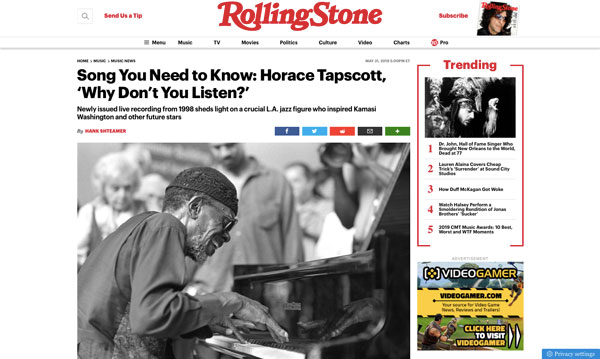• Hank Shteamer // Rolling Stone (31 mai 2019)
Song You Need To Know: Horace Tapscott, ‘Why Don’t You Listen?’
Newly issued live recording from 1998 sheds light on a crucial L.A. jazz figure who inspired Kamasi Washington and other future stars
Unless you’re a hardcore jazz aficionado, you might not know the name Horace Tapscott. But to several generations of L.A. musicians — including breakout saxophone star Kamasi Washington— the late pianist and composer is a near-legendary figure.
“I grew up in Leimert Park and his footprint is all over that area,” Washington said in 2015 of Tapscott’s importance to his South L.A. neighborhood. “We all learned his music and his philosophies from the elders who played with him that are still with us. Horace is one of the most important figures in the foundation of music in L.A., from both a purely musically and socially conscious perspective. My dad took me to hear [Tapscott’s] Pan Afrikan Peoples Arkestra many times and I played with them after Horace passed away.”
If Washington’s sound — specifically the large-scale, spirit-lifting jazz-meets-gospel-meets-R&B documented on his 2015 breakthrough The Epic and its 2018 follow-up Heaven and Earth — has a patron saint, it would have to be Tapscott. From the early Sixties through his death in 1999, the pianist helped to anchor a community-driven L.A. scene, bringing together musicians, singers and poets in both the Arkestra (the name nods to a group led by Tapscott’s like-minded predecessor Sun Ra) and an umbrella group called UGMAA, the Union of God’s Musicians and Artists Ascension.
A new archival release, Why Don’t You Listen?, captures the ensemble that inspired Washington and his peers in the form of a 1998 Arkestra concert at the L.A. County Museum of Art, reportedly the final time Tapscott was healthy enough to play piano with the band live. Released by Dark Tree, a French label named for a Tapscott piece, it joins a wealth of other Tapscott and UGMAA work now available digitally.
The album’s near-15-minute title track makes for a fine introduction to Tapscott’s expansive approach. While much of the Arkestra’s available output focuses on the leader’s intricate instrumental writing, which ranges from funky to free, “Why Don’t You Listen?” spotlights the voice. On the piece, co-written by Tapscott and Linda Hill, a nine-member choir known as the Great Voice of UGMAA — directed by Dwight Trible, who remains committed to Tapscott’s mission — sings out stirring variations on a central question: “Why didn’t you listen to the sounds of truth?”
After a brief, expressionistic piano intro, the vocalists sing out a somber opening (“Go forth my seed / And spread the truth …”). From there, the tempo picks up, and the singers begin calling out a series of jazz icons — “Why didn’t you listen to Bird and Trane … ?/ Why didn’t you listen to Lady Day?” — over an insistent pulse, complete with hand percussion, booming brass and emphatic shouts. Around the five-minute mark, the piece breaks into brisk post-bop swing, with the soprano sax of Michael Session swooping over top. A solo vocal episode and a slashing drum feature by Donald Dean lead back into the “Why didn’t you listen …?” refrain.
The track’s blend of somber, gospel-like textures with upbeat, unfettered improv does have precedents in jazz — Duke Ellington’s Sacred Concerts, grand Charles Mingus works like “Meditations on Integration” — but Tapscott clearly developed his own rich aesthetic. Throughout Why Don’t You Listen?, it’s easy to hear why up-and-comers like Washington were so struck by his vision — and following that thread to Washington’s own work, equally plain to hear the echo of an earlier L.A. jazz revolution.
• • • • • • • • • • • • • • • • • • • • • • • • • • • • • • • • • • • • • • • • • • • • • • • • • • • • • • • • • • • • • • • •

Sorry, the comment form is closed at this time.